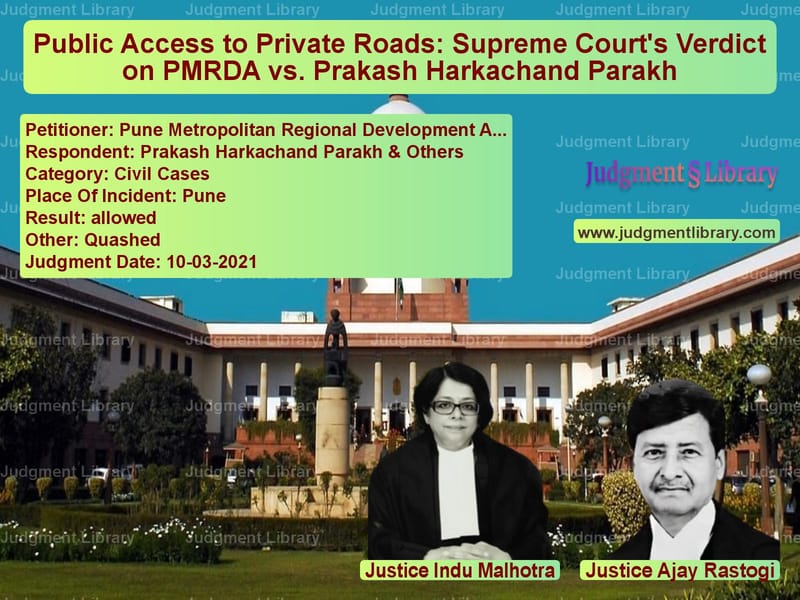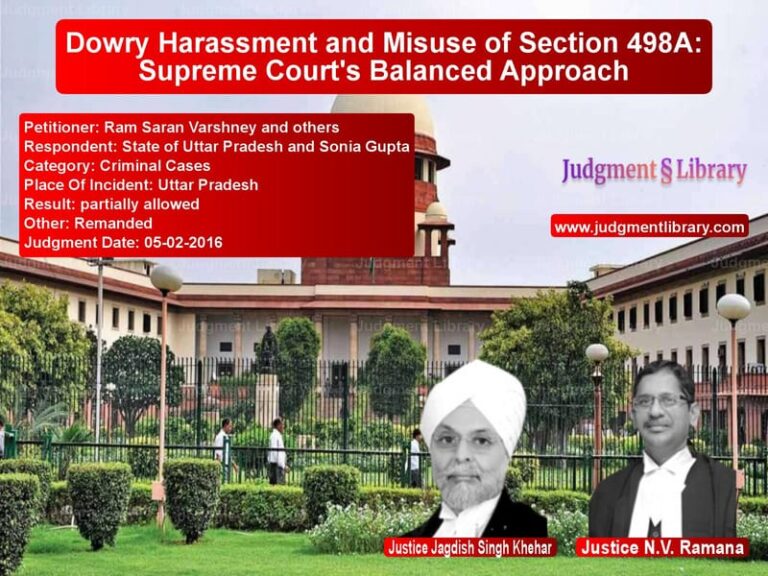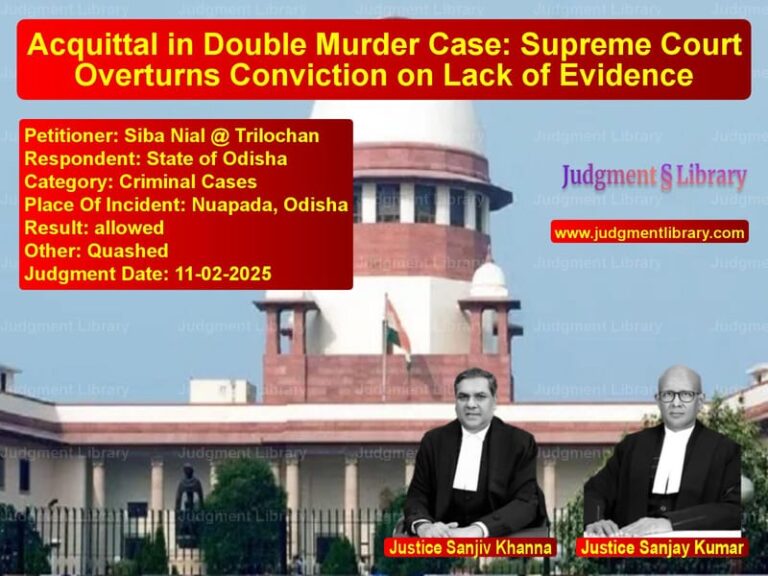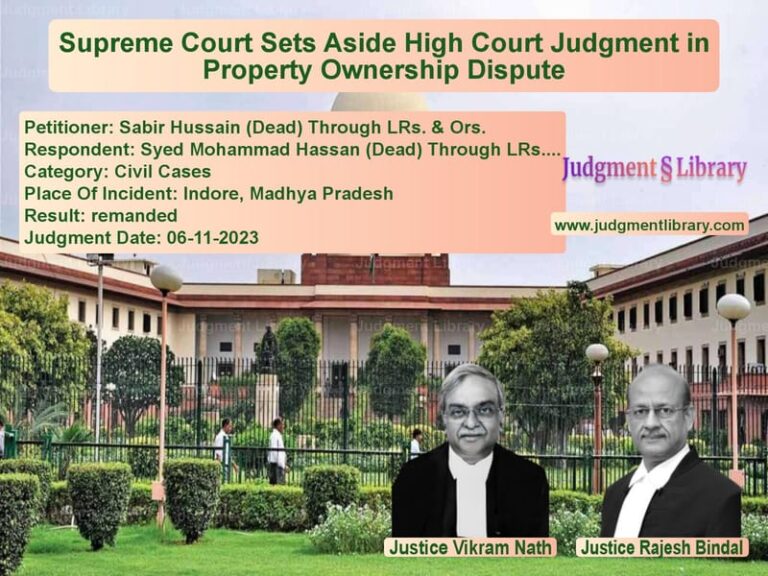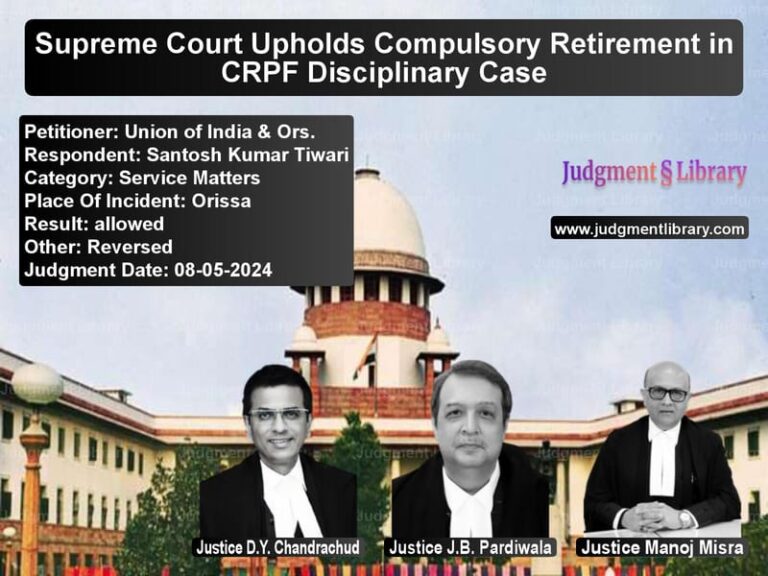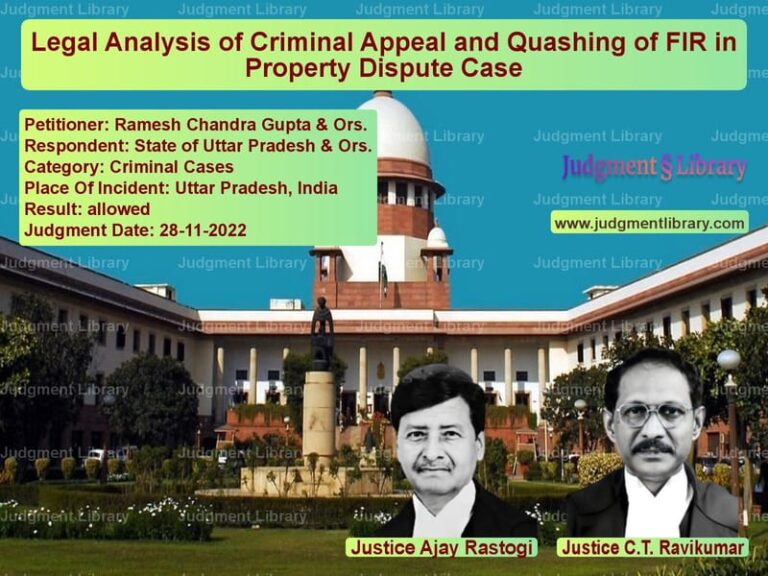Public Access to Private Roads: Supreme Court’s Verdict on PMRDA vs. Prakash Harkachand Parakh
The case of Pune Metropolitan Regional Development Authority (PMRDA) vs. Prakash Harkachand Parakh & Others revolves around the issue of public access to a private road in a residential layout. The Supreme Court, in its verdict, set aside the High Court’s interim order that modified the access conditions to the road. The case highlights the conflict between urban planning regulations and private property rights, ultimately questioning the limits of judicial review.
Background of the Case
The dispute concerns a 12-meter-wide internal road situated in a residential project developed by the respondent, Prakash Harkachand Parakh. The project is located in Survey No. 65A, Majri BK, Tal Haveli, Pune. The layout plan, submitted for approval to the authorities, included a provision that roads and open spaces within the project should be accessible to the public.
The appellant, PMRDA, argued that the conditions for non-agricultural land use approval required the developer to keep the internal roads open for public use. However, the respondent attempted to limit access, which led to a legal conflict.
High Court’s Interim Order
During the litigation, the High Court issued an interim order on October 4, 2019, imposing a time-based restriction on the road’s public usage. The key provisions of the order were:
- The road could only be used by the public between 5:30 AM and 8:30 PM.
- The developer was permitted to install iron gates or boom barriers and place security personnel.
- Public parking was prohibited on the road.
- Only light motor vehicles, two-wheelers, and auto-rickshaws were allowed to use the road.
- The arrangement would remain in force until the final resolution of the writ petition.
The PMRDA challenged this order, arguing that the High Court had exceeded its jurisdiction under Article 226 of the Constitution.
Arguments of the Parties
Petitioner’s Arguments (PMRDA):
- The High Court had exceeded its jurisdiction by modifying an administrative order through an interim arrangement.
- The road was designated for public use in the approved layout and could not be privatized.
- The conditions imposed by the High Court were contrary to urban planning laws and could set a precedent allowing developers to restrict public access to designated roads.
The Supreme Court noted PMRDA’s argument: “The nature of modification which has been made by the High Court in the form of an ad-hoc interim arrangement, in our view, is exceeding its jurisdiction and not within the realm of power of judicial review to be exercised under Article 226.”
Respondent’s Arguments (Prakash Harkachand Parakh & Others):
- The road was part of private property and should not be subject to unrestricted public use.
- The High Court’s order ensured a balanced approach, allowing limited public access while preserving the rights of the developer and residents.
- The PMRDA’s directive was arbitrary and imposed undue hardship on the property owners.
Supreme Court’s Verdict
The Supreme Court ruled in favor of PMRDA, stating that the High Court’s interim order was beyond its jurisdiction. The Court emphasized that interim orders should not grant final relief or alter existing regulations unless absolutely necessary.
The judgment stated: “It is well settled that by an interim order, even the final relief ordinarily should not be granted.”
The Supreme Court quashed the High Court’s order and clarified that the writ petition regarding the road’s status should be decided independently by the High Court on its merits.
Final Judgment
The Supreme Court’s order concluded:
- The High Court’s interim order dated October 4, 2019, is quashed and set aside.
- The High Court must decide Writ Petition No. 8242 of 2019 on its own merits without being influenced by this ruling.
- No costs were imposed on either party.
The ruling reinforced the principle that judicial review should not extend to making policy decisions through interim measures. The case remains pending before the High Court for final adjudication.
Petitioner Name: Pune Metropolitan Regional Development Authority (PMRDA).Respondent Name: Prakash Harkachand Parakh & Others.Judgment By: Justice Indu Malhotra, Justice Ajay Rastogi.Place Of Incident: Pune.Judgment Date: 10-03-2021.
Don’t miss out on the full details! Download the complete judgment in PDF format below and gain valuable insights instantly!
Download Judgment: pune-metropolitan-re-vs-prakash-harkachand-p-supreme-court-of-india-judgment-dated-10-03-2021.pdf
Directly Download Judgment: Directly download this Judgment
See all petitions in Property Disputes
See all petitions in Landlord-Tenant Disputes
See all petitions in Contract Disputes
See all petitions in Damages and Compensation
See all petitions in Judgment by Indu Malhotra
See all petitions in Judgment by Ajay Rastogi
See all petitions in allowed
See all petitions in Quashed
See all petitions in supreme court of India judgments March 2021
See all petitions in 2021 judgments
See all posts in Civil Cases Category
See all allowed petitions in Civil Cases Category
See all Dismissed petitions in Civil Cases Category
See all partially allowed petitions in Civil Cases Category

